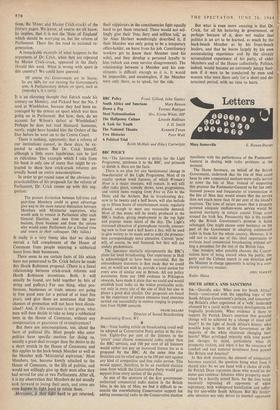SIR,—Your leading article on broadcasting could well be adopted as
Conservative Party policy at the elec- tion. Eighty-five per cent of the listeners in the 'pirate' areas choose commercial _radio rather than the BBC services, and 100 per cent of all listeners would rather not pay an increased licence fee as is proposed by the BBC. At the same time the Socialists can be relied upon to be 100 per cent against any kind of competitive and free radio service. This would appear, therefore, to be an excellent election issue from which the Conservative Party would gain support from every section of the public.
As one of the sponsors of the first government- authorised commercial radio station in the British Isles, in the Isle of Man, we find it difficult to re- concile the overwhelming Conservative support for adding commercial radio to the Conservative election But what is even more amazing is that Dr. Crick, for all his lecturing in government, or perhaps because of it, does not realise that politics is an art to be learned, as much by the back-bench Member as by his front-bench leaders, and that he learns largely by his own accumulating experience and by the already accumulated experience of his party, of older Members and of the House collectively. Politics, indeed, would become an extremely jumpy busi- ness if it were to be conducted by men and women who were there only for a short and de- termined period, with no time to learn.


































 Previous page
Previous page